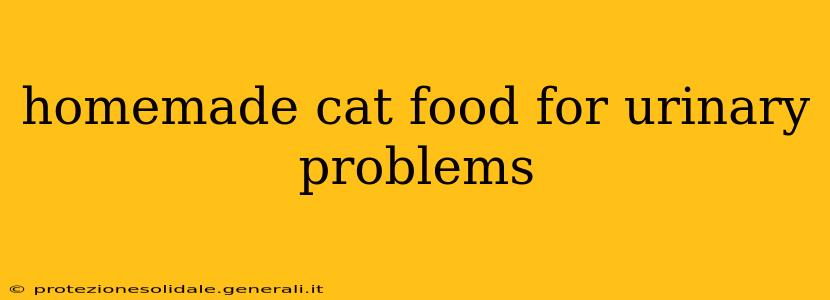Feline urinary tract issues are a common concern for cat owners, often requiring careful management of diet. While commercial veterinary diets are readily available, many owners explore homemade options to better control their cat's nutrition and address specific needs. This guide explores the creation of homemade cat food designed to support urinary tract health, emphasizing crucial considerations for safety and efficacy. Always consult your veterinarian before making significant dietary changes for your cat, especially if they have pre-existing health conditions.
What Causes Urinary Problems in Cats?
Before diving into recipes, it's crucial to understand the underlying causes of feline urinary tract issues. These can range from simple infections (like cystitis) to more complex problems like feline idiopathic cystitis (FIC), kidney disease, or bladder stones. Different types of urinary problems require different dietary approaches. Some common causes include:
- Bacterial Infections: These infections can inflame the urinary tract, causing pain and discomfort.
- Feline Idiopathic Cystitis (FIC): This stress-related condition involves inflammation of the bladder, often without bacterial infection.
- Bladder Stones: These can obstruct urine flow, leading to severe complications. Diet plays a significant role in preventing and managing certain types of bladder stones.
- Kidney Disease: Chronic kidney disease affects the kidneys' ability to filter waste products from the blood, impacting urine production and composition.
What Should Homemade Cat Food for Urinary Problems Include?
Creating a homemade diet for a cat with urinary problems requires careful consideration of several key ingredients and nutritional aspects. The goal is to create a food that:
- Dilutes urine: Increasing water intake is critical in flushing out the urinary tract.
- Reduces mineral saturation: Certain minerals contribute to the formation of bladder stones. Controlling their levels in the diet is crucial.
- Supports a healthy urinary pH: Maintaining the correct pH level helps prevent the formation of certain types of stones.
- Provides adequate hydration: Adding moisture-rich ingredients like broth or canned pumpkin can enhance hydration.
- Offers complete and balanced nutrition: Homemade cat food must meet all the nutritional needs of your cat to prevent deficiencies.
Key Ingredients to Consider:
- High-quality protein sources: Chicken, turkey, or fish (avoiding bones and excessive fat).
- Limited minerals: Reduce phosphorus and magnesium to prevent certain types of stones.
- Increased water content: Use low-sodium broth or canned pumpkin to increase moisture.
- Cranberries (in moderation): Some studies suggest cranberries may help prevent bacterial adhesion to the urinary tract. However, excessive cranberry consumption can cause digestive upset.
- Fiber: Can help with bowel regularity and overall digestion.
How to Make Homemade Cat Food for Urinary Problems (Example Recipe)
This recipe serves as a starting point and should be adjusted based on your cat's specific needs and under veterinary guidance.
Ingredients:
- 1 cup cooked chicken breast (diced)
- ½ cup cooked sweet potato (mashed)
- ¼ cup cooked green beans (finely chopped)
- 2 tablespoons low-sodium chicken broth
- 1 tablespoon canned pumpkin (plain, not pie filling)
Instructions:
- Combine all ingredients in a bowl and mix thoroughly.
- Ensure the mixture is well-cooked and free of bones or other hazardous materials.
- Serve at room temperature or slightly warmed.
Note: This is a sample recipe and should not be considered a complete and balanced diet for all cats. Consult your veterinarian to determine appropriate portion sizes and adjust the recipe based on your cat's specific needs.
What are the potential risks of feeding my cat homemade food?
While homemade food offers control, it carries potential risks if not carefully planned:
- Nutrient Deficiencies: Without a proper understanding of feline nutritional requirements, homemade diets might lack essential vitamins and minerals.
- Toxicity: Certain human foods are toxic to cats.
- Bacterial Contamination: Improper handling and storage can lead to bacterial growth, causing illness.
- Imbalance: An unbalanced diet can lead to various health problems over time.
Is there a specific diet for struvite crystals?
Yes, diets for struvite crystals typically focus on reducing the urinary pH to make the urine less favorable for struvite formation. These diets usually have lower levels of magnesium and phosphorus.
Can I use commercial cat food with homemade additions?
You can supplement commercial cat food designed for urinary health with small amounts of homemade additions, such as cooked chicken or vegetables, for enhanced palatability and moisture content. But always consult your vet.
How often should I feed my cat homemade food for urinary problems?
The feeding frequency depends on your cat's individual needs and your vet's recommendation. It may involve one to three meals per day.
How do I know if the homemade food is helping my cat?
Monitor your cat's urine output, litter box habits, and overall health. Consult your vet regularly for blood and urine tests. Improvements in these areas often indicate the diet is effective.
Disclaimer: This information is for educational purposes only and should not be considered veterinary advice. Always consult your veterinarian before making any dietary changes for your cat. The health and well-being of your pet should always be prioritized. Regular veterinary check-ups and blood work are essential for monitoring your cat's urinary health.
